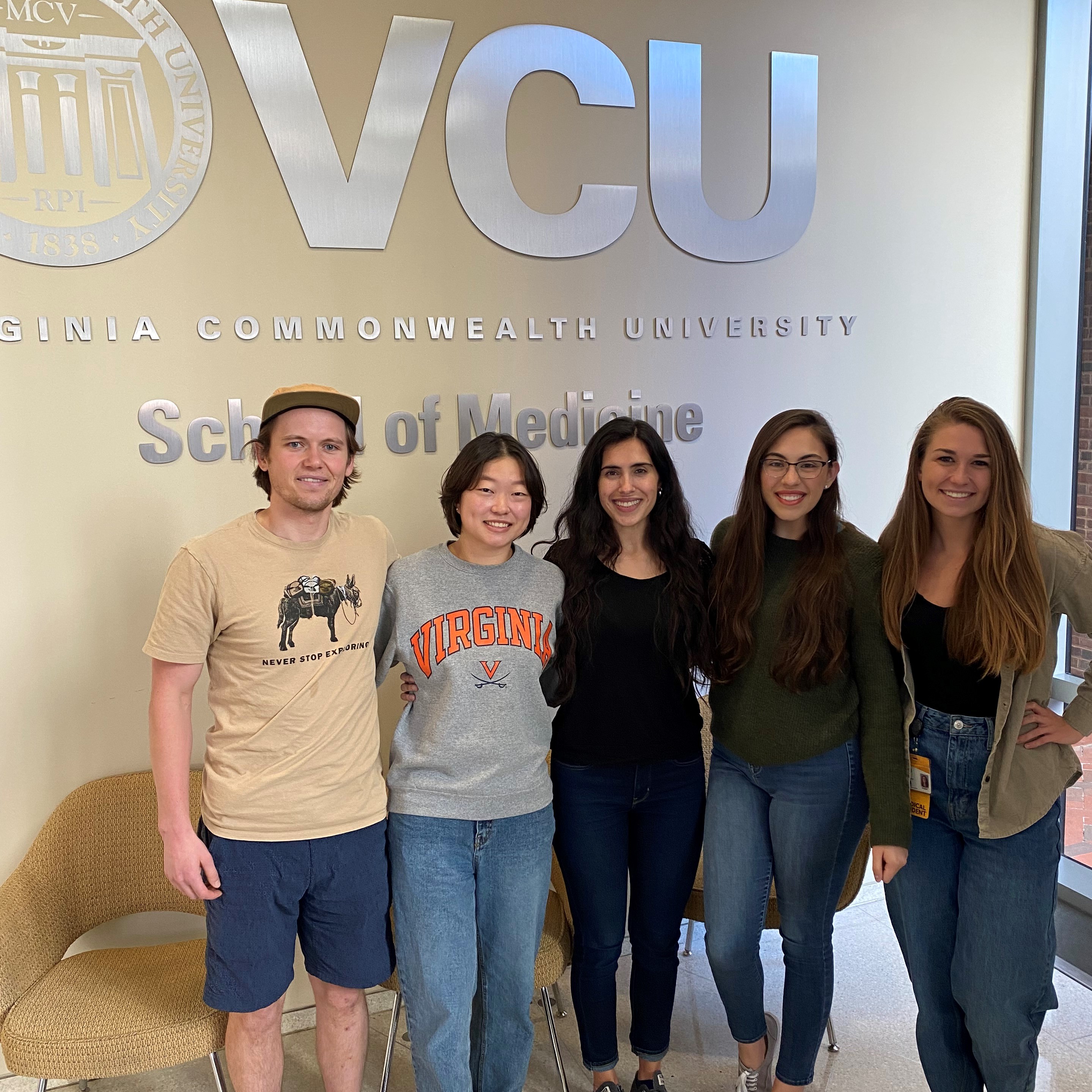Advocacy in medicine
LMSA students seek to improve health care for Spanish-speaking patients through the development of medical interpretation skills, mentorship and community outreach

Latino Medical Student Association executive board: Jeremy Allred, M2, language co-chair (far left), Annette Min, M2, language co-chair (second from left), Demitra Chavez, M2, president (middle), Rebecca Moncayo, M2, outreach coordinator (second from right), Claudia Bale, M2, treasurer (far right)
According to a report in 2019 by the Association of American Medical Colleges, only 3.8% of active physicians identified as Hispanic, Latino, or of Spanish origin.
The Latino Medical Student Association, or LMSA, is a VCU student organization that recruits and supports individuals who are interested in improving access and delivery of health care to the Latinx and medically underserved populations.
“I see myself working with the Latino community throughout my career,” said M2 Demitra Chavez, the president of LMSA. “Seeing some of the inequities Spanish-speaking patients faced first-hand were some of the reasons why I joined LMSA.”
Learning medical interpretation
During her time as a scribe prior to coming to medical school, Chavez witnessed that even with a medical interpreter present, communication between providers and Spanish-speaking patients could be a challenge due to the language barrier. “The language barrier required physicians to rely more on the physical exam findings,” said Chavez, who holds an Aesculapian Scholarship established through the School of Medicine’s Annual Fund. “I think it led to not having the full physician-patient relationship.”
Guidelines and best practices for medical interpretation are in place to help a patient. Not following those best practices can magnify the challenges already presented by the language barrier, resulting in failing to build a rapport with the patient and not getting the entire medical story.
VCU Health provides Spanish-speaking patients with staffed medical interpreters, but if an in-person interpreter isn’t available, providers communicate with patients with the help of a telehealth platform called Martti. This technology allows a two-way video and audio connection to a certified medical interpreter to assist in translation.
Last semester, LMSA hosted a lunch lecture designed to teach students how to work with interpreters to help bridge the language barrier gap. Presenters shared best practices, including asking fewer questions at a time, making eye contact with the patient and not speaking directly to the interpreter so the patient will feel empowered to respond.
“I think a big thing is being able to be comfortable with patients who don’t speak the same language,” said M2 Rebecca Moncayo, the LMSA’s outreach coordinator. “It is really important that we are forming a group of students to all be comfortable working with interpreters.”
Mentorship and outreach
Along with working to shrink the language barrier between physicians and patients, mentorship and community outreach are big priorities for LMSA.
“A lot of underrepresented minorities may not have access to mentorship,” Moncayo said. “That’s why I really think it is important to be a mentor to people.”
LMSA collaborates with Collective Corazón at VCU, a student group that advocates for Latinx health equity in the Richmond area. The two groups co-host Spanish language sessions and LMSA members provide mentorship to undergraduate students who are interested in pursuing careers in health care.
Additionally, LMSA members partner with the Sacred Heart Center, a local community center that provides a broad range of services to Latinx families, by volunteering at the organization’s medical clinic and foodbank.
Learn more
As a way to connect with and inform students at VCU School of Medicine about the social and health issues affecting the Latinx community in Richmond, LMSA organizes several events. To learn more, please email them at mcvlmsa@gmail.com.